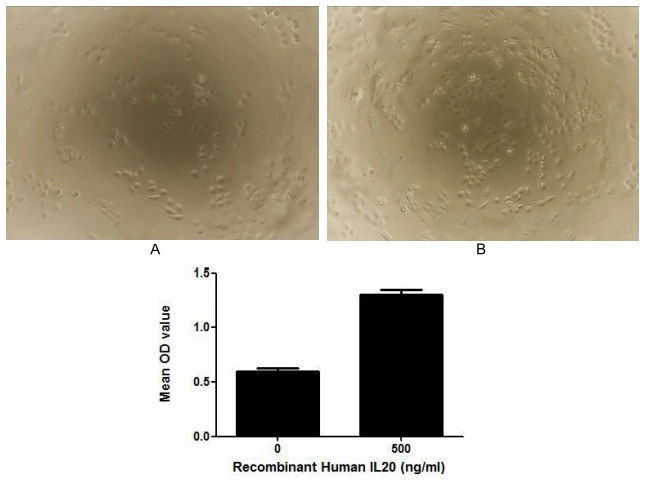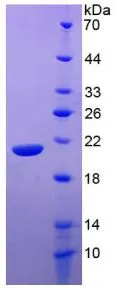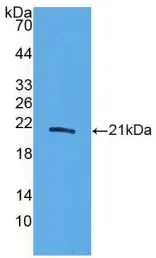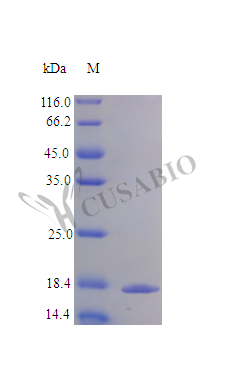
Cell proliferation effect of GTX00137-pro Human IL20 protein (active). Cell viability was measured by Cell Counting Kit-8 (CCK-8). (A) Unstimulated ECV-304 cells cultured in RPMI-1640 for 48hrs. (B) ECV-304 cells cultured in RPMI-1640, stimulated with 500 ng/ml IL20 for 48hrs.
Human IL20 protein, His tag (active)
GTX00137-PRO
ApplicationsFunctional Assay
Product group Proteins / Signaling Molecules
Protein IDQ9NYY1
Overview
- SupplierGeneTex
- Product NameHuman IL20 protein, His tag (active)
- Delivery Days Customer9
- Application Supplier NoteIL20 (Interleukin-20) is a cytokine structurally related to interleukin 10, which is produced by activated keratinocytes and monocytes. It is accepted that IL20 regulates proliferation and differentiation of keratinocytes during inflammation, particularly inflammation associated with the skin. Thus, proliferation assay of IL20 was conducted using ECV-304 cells. Briefly, ECV-304 cells were seeded into triplicate wells of 96-well plates at a density of 2000 cells/well and allowed to attach overnight, then the medium was replaced with serum-free standard RPMI-1640 prior to the addition of various concentrations of IL20. After incubated for 48h, cells were observed by inverted microscope and cell proliferation was measured by Cell Counting Kit-8 (CCK-8). Briefly, 10 microl of CCK-8 solution was added to each well of the plate, then the absorbance at 450nm was measured using a microplate reader after incubating the plate for 1-4 hours at 37C. Proliferation of ECV-304 cells after incubation with IIL20 for 48h observed by inverted microscope. Cell viability was assessed by CCK-8 (Cell Counting Kit-8 ) assay after incubation with human recombinant IL20 for 48h. The human IL20 significantly decreased cell viability of ECV-304 cells.
- ApplicationsFunctional Assay
- CertificationResearch Use Only
- ConjugateUnconjugated
- Gene ID50604
- Target nameIL20
- Target descriptioninterleukin 20
- Target synonymsIL-20, IL10D, ZCYTO10, interleukin-20, cytokine Zcyto10, four alpha helix cytokine
- Protein IDQ9NYY1
- Protein NameInterleukin-20
- Scientific DescriptionThe protein encoded by this gene is a cytokine structurally related to interleukin 10 (IL10). This cytokine has been shown to transduce its signal through signal transducer and activator of transcription 3 (STAT3) in keratinocytes. A specific receptor for this cytokine is found to be expressed in skin and upregulated dramatically in psoriatic skin, suggesting a role for this protein in epidermal function and psoriasis. [provided by RefSeq, Jul 2008]
- Storage Instruction-20°C or -80°C,2°C to 8°C
- UNSPSC41116120
- SpeciesHuman






